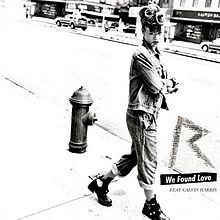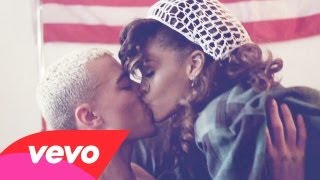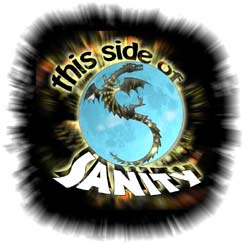| |
song info

 “We Found Love” by Rihanna featuring Calvin Harris (official video) is a pop song.
Song Title: We Found Love (official video)
Artist: Rihanna featuring Calvin Harris
Album: Talk That Talk and 18 Months
Genre: pop, adult pop, dance, electro house, dance-pop
Composer: Copyright © 2011 Calvin Harris
Musical key: G♭ Major
Lead Vocals: Rihanna
Instruments: Calvin Harris
Director: Melina Matsoukas
Producer: Calvin Harris
Recorded: 2011, Fly Eye Studios (London), Westlake Recording Studios (Los Angeles)
Mixer: Calvin Harris
Released: September 22, 2011
Label: Def Jam, SRP
Number of listens: 38803
  
Summary quotation from Wikipedia:
“We Found Love” is a song recorded by Barbadian singer Rihanna for her sixth studio album, Talk That Talk (2011). It was written and produced by and features Scottish DJ Calvin Harris and is also featured on his album 18 Months. Harris has also produced one more song for Talk That Talk called “Where Have You Been”.
“We Found Love” premiered on September 22, 2011, in the United Kingdom on the Capital FM radio station and was made available to download on the same day as the lead single from the album. The track is a dance-pop and electro house song, with elements of techno and Europop. It is backed by repetitive synthesizers, alarm bells, and a keyboard. The song’s lyrics speak of a couple who “found love in a hopeless place”.
“We Found Love” was met with mixed reviews from music critics, who praised the song’s composition and Rihanna’s vocal performance; however, some critics felt that the lyrical content was sparse and came second to Harris’ production. “We Found Love” was a major commercial success. In the United States, the song topped the Billboard Hot 100 for ten non-consecutive weeks, becoming the longest running number one single of 2011 and of the 2010s until Robin Thicke’s “Blurred Lines” (2013), as well as surpassing “Umbrella” as her longest running number one single. It became Rihanna’s eleventh song to top the Hot 100, placing her in third place amongst female recording artists amassing the most number one singles. “We Found Love” topped the charts in twenty-five countries including Canada, Ireland, New Zealand, Switzerland and the United Kingdom. It also attained top five positions in Australia, Belgium and Czech Republic and peaked in the top ten of charts in twenty-nine countries worldwide, becoming one of the most successful songs in 2011 and 2012 as well becoming the 24th most successful single of all time on Billboard. Worldwide the single has sold over 8.1 million copies making it one of the best selling singles of all time.
The song’s accompanying music video, directed by Melina Matsoukas, depicts the singer as a drug-abusing thrill-seeker in a relationship that quickly spirals downward into addiction and violence. The video received a mixed response from critics, as they noted that it profoundly alludes to ex-boyfriend Chris Brown’s assault on Rihanna, two years prior. It attracted criticism from political commentators, who questioned the video for its suggestive sexual nature. However, its impact was significant, with the video winning a Grammy for “Best Short Form Music Video” at the 55th Annual Grammy Awards and “Video of the Year” at the 2012 MTV Video Music Awards. The song has been performed on both the UK and US versions of The X Factor, as well as at the 2012 Grammy Awards and the 2012 BRIT Awards. “We Found Love” became the number-one Top 40 song of 2012.
Background
“It changed absolutely everything. Career-wise it was the best thing that could ever have happened. For example, in America my tune ‘Feel So Close’ came out about three months before. But when ‘We Found Love’ came out, the radio started playing ‘Feel So Close’ like it was the single after. Then that did really well, it charted well and sold a lot of copies.
—Harris talking about the success of “We Found Love” ”
Following the release and success of her album Loud (2010), Rihanna originally revealed via Twitter that the album would be re-issued with new songs and released in Fall 2011, writing that “[t]he [Loud era] continues with more new music to add to [your] collection”. In September 2011, Rihanna again took to the social networking site to confirm that the plans had been scrapped, with the singer tweeting “I [thought about] a [re-release], but LOUD is its own body of work! Plus [you] guys work so hard that [you] deserve to act brand new”. On September 19, 2011, Rihanna further provoked excitement amongst her followers when she posted that she was listening to the song, only to be re-tweeted by Calvin Harris, who replied “Sometimes it feels like we find love in the most hopeless place”, suggesting that his response contained possible lyrics from the song. In an interview with Capital FM, Harris — who produced the track — explained that followers of Rihanna had sent messages to him regarding their expectations of the song, saying “The song better not be rubbish”, which he interpreted as slightly threatening, but went on to say that “it’s all part of the fun”. In an interview for Q magazine, Harris said of the lyric, “we found love in a hopeless place,” “It could have been Jumpin Jaks in Dumfries (Harris’ home town), I don’t know exactly what I was thinking about.”
“We Found Love” premiered in the United Kingdom on September 22, 2011, on Capital FM, and was sent for mainstream adds in the United States on October 11, 2011. The song was released via iTunes on September 22, 2011. During an interview with MTV News, Calvin Harris revealed, “‘We Found Love,’ is the most successful thing I’ve done ever… It’s not strictly a song by me, obviously, it’s by Rihanna. She sings it…It was great to work with her… No one could have taken it as far as she did. You can’t escape it here [in America]. I’ve heard it a lot. I’ve heard it probably more times today than I did when I was mixing it. Which is a good thing… Ever since the Rihanna song did well, a lot of people want to do some stuff, which is great… That’s what I enjoy doing. In terms of actual names, I’ve not done anything yet.” In October 2012, British singer Leona Lewis claimed that she was originally chosen to sing the song but ended up losing it to Rihanna when Harris went touring with the latter, commenting. “I didn’t commit to it because I wanted “Trouble” to be my first single so I think that was another reason they went with Rihanna. It was the same version and production but mine’s better.” In 2013, Nicole Scherzinger claimed that she was the first artist given the song but ended up rejecting it, commenting. “I’ve got the demo of that song and I was busy at the time. They’d sent me a few dance tracks and I wasn’t able to get to them and I was like, ‘Oh there’s so much dance and I want to take a break from it.’”
Artwork
The artwork for “We Found Love” was released by Rihanna’s official Facebook page on September 22, 2011. Grady Smith of Entertainment Weekly’s The Music Mix criticized the song’s artwork, writing “‘We found love in a hopeless place,’ Rihanna repeats over a David Guetta-ish synth beat. But judging by the single cover, her place doesn’t look too hopeless, does it? Maybe there’s a building on fire outside the frame, and that fire hydrant doesn’t work. I guess that would be hopeless.” A reviewer for Sugar Magazine wrote that “On anyone else this would be a pretty odd look but Rihanna somehow makes a denim overload look good.” A reviewer for Neon Limelight commented that Rihanna appeared to be adopting a tomboy image for the new project, writing, “She really is going for that sexy tomboy look this album era it seems; remember the laid back look she rocked on the single’s cover art?”.
Composition
“We Found Love” is an electro house and dance-pop song. It also displays elements of Europop, pop, techno, trance, and Euro disco. According to the digital music sheet published at musicnotes.com, the song is written in the key of G-flat major and it is set at a tempo of 128 beats per minute. The instrumentation of “We Found Love” consists of alarm bells, a keyboard, repetitive pumped-up synthesizers and 4/4 beats.
Rihanna’s vocal range in the song spans one octave, from the lower note of D♭4 to the higher note of D♭5. Priya Elan of NME commented that Rihanna sounds “extremely relaxed” and Bill Lamb of About.com wrote that her vocals are simple and unaffected. Leah Collins of The Vancouver Sun wrote that Rihanna’s vocals on “We Found Love” were similar to her own ones on “Fly”. According to Elan, the keyboard work in the song bears resemblance to that in from “Only Girl (In the World)” and the melody is similar to that of “Complicated”, a track included in Rihanna’s 2010 studio album Loud. Similarly, Michael Cragg of The Guardian noted that “We Found Love” is in the same vein as “Only Girl (In the World)”, with regard to its dance beat.
The lyrical content of the song is spare and largely revolves around Rihanna chanting the song’s hook line, “We found love in a hopeless place”. Jody Rosen of Rolling Stone described it as “half-baked romantic”. Rihanna starts the song in a falsetto airy voice as she sings, “Yellow diamonds in the light / And we’re standing side by side / As your shadow crosses mine / What it takes to come alive.” Michael Cragg commented that the first chorus is almost being sidelined in favor of a large chunk of Harris’s riff, before they join on the second chorus. The hook repeatedly rings throughout the song.
Critical reception
The song received widespread acclaim from music critics, with most commenting on its lyrical content. Amanda Dobbins of New York magazine praised the composition of the song, writing “Harris’s electro fingerprints are all over this one — it plays like a straight house track, with some dreamy Rihanna vocals added in over the beat.” Robbie Daw of Idolator commented on the song’s lyrics, with particular emphasis on the line “We found love in a hopeless place”, writing that it is possibly the best lyric in pop music so far in 2011. A reviewer for Instinct magazine praised the song, writing that “We Found Love” does not mark a departure from the dance-floor oriented material Rihanna debuted on Loud, but it certainly boasts “a higher-energy, peak-hour vibe”. Similarly, Michael Cragg of The Guardian commented that the song takes the dance direction Rihanna hinted at on “Only Girl (In the World)” and continues releasing similar songs, making reference to “We Found Love”. Cragg also likened the song to Leona Lewis’s recent single, “Collide”, but criticized the song’s structure, writing “[it] is slightly odd”. He ended his review writing, “Either way, she could have recited Nick Clegg’s conference speech from Wednesday over the sound of Harris cracking his knuckles and it would be a hit.”
Priya Elan of NME commented, “By now it’s pretty customary to have a jaw-on-the-floor reaction to the first single from a Rihanna album. ‘Pon De Replay’, ‘SOS’, ‘Umbrella’, ‘Russian Roulette’, ‘Only Girl In The World’.” Despite complimenting Rihanna for sounding extremely relaxed and calling her vocal as “luxurious calling to mind the atmosphere”, Elan concluded that the over-all effect is underwhelming. She continued by writing that instead of re-inventing the pop wheel, “We Found Love” has “a whiff of treading-water about it” and that “if there is a ‘goosebump’ moment to be had it comes after many multiple plays and, dare we say it, a glass of something strong.” Awarding “We Found Love” two stars out of five, Jody Rosen of Rolling Stone was critical, writing that it “is much ado about very little indeed” and that is “an insipid tune”. He concluded that Rihanna repeats ‘We found love in a hopeless place’ “approximately 350 times, hoping it will start to mean something. It’s the worst single of Rihanna’s career. It will probably top the Hot 100 anyway.” Leah Collins of The Vancouver Sun initially praised Rihanna’s vocal performance in the song, writing that she “smoothes out her vocals”, before adding, “Angelic as she sounds, though, [her] performance — which is mostly just her repeating the line ‘We found love in a hopeless place’ — seems to take second place to Harris’ repetitive synth-based blare.” Similarly, Amos Barshad of Grantland criticized the singer’s vocal performance, calling it “a complete afterthought” before concluding, “People who regularly attend the Electric Zoo festival: Rihanna wants your money!”
A reviewer for GlobalGrind commented on the song’s lyrics, suggesting that there is perhaps an underlying message in the song for ex-boyfriend Chris Brown, in the line “We found love in a hopeless place”. This further raised suspicion when Brown re-tweeted one of Rihanna’s posts on Twitter, which read “Sometimes it feels like we find love in the most hopeless place”. Jessica Herndon of People magazine praised the song, saying that “‘We Found Love’ had an amazing influence on people all across the world in 2012, becoming one of the most popular and most successful songs”.
Pitchfork Media commented, “Over a frantic, Calvin Harris-produced, Guetta-meets-‘Sandstorm’ beat on her sixth record’s lead-off single, Rihanna repeats these words almost 20 times. ‘We Found Love’ ranks among Ri’s best singles because it recognizes that there’s not much more that needs to be said: in three and a half minutes, the line moves from being a great pop lyric to a triumphant mantra to something suggestive of a whole spectrum of unspoken emotion. The best pop music transports you to somewhere beyond words, and Rihanna’s strongest singles all seem to be in on this secret.” Allmusic chose the song as a highlight on Talk That Talk, and wrote about the “singer’s ecstatic vocal than Calvin Harris’ shrill, plinky production”. Los Angeles Times commented that the song was an “ode for bad love” and added it “wouldn’t be out of place at Electric Daisy Carnival”. The New York Times’ writer commented “‘We Found Love’ almost criminally recalls the swinging Crystal Waters singles, with triumphant percussion somewhere between church and seventh-inning stretch.” Billboard magazine also praised the song, saying that: “Through a haze of glitter and bliss, Rihanna emerges to let us find a gorgeous hook in a hopeless place, and Calvin Harris becomes a household name.” USA Today considered the song to be a highlight on the set, commenting that Rihanna sings “bistfully”. Slant Magazine was more negative about the song, saying, “It’s hard to imagine anything else on Talk That Talk matching the success of ‘We Found Love,’ but, then again, she’s taken worse material to the Top 10”. Entertainment Weekly noted, “U.K. club king Calvin Harris trades Rihanna’s usual somber synths for disco ecstasy on ‘We Found Love,’ a song that builds and builds to a climax that’s so arena-ready it practically begs for someone to blow a vuvuzela”.
Recognition and awards
MTV chose “We Found Love” as the third best song of 2011, and “Video of the Year” at the MTV Video Music Awards 2012. The writers of the website further commented, “The leadoff single from Talk That Talk is where Rihanna fully embraced EDM. Produced by Calvin Harris, ‘We Found Love’ is a swirling party track about love and loss, the rare song that manages to be sad and joyous all at once. And it is a pinnacle of the pop/dance crossover, a throwback to ’90s raves that could make even the most stoic lover of pop want to break out a glow stick and just dance”. Rob Sheffield of Rolling Stone put “We Found Love” at number eleven on his list of Top 25 Songs of 2011 commenting, “While her other hits tried to camouflage her spindly voice, here it just strains for that spindly melody.” It was named the third biggest love song of all time by Billboard.
Music video
The music video for “We Found Love” was shot in late September 2011, in County Down, Northern Ireland and the New Lodge area of North Belfast. The video was directed by Melina Matsoukas, who had previously directed the videos for “Hard” (2009), “Rude Boy” (2010), “Rockstar 101” (2010) and the controversial “S&M” (2011). Anticipation for the video grew in the United Kingdom when the national news picked up on the story of sixty-one year-old Northern Ireland farmer Alan Graham withdrawing his permission to film in his barley field in Bangor, County Down after taking issue with Rihanna’s clothing, focusing on her appearing topless and also wearing a red bikini top which he thought was an “inappropriate state of undress”. Rihanna and her film crew departed amiably after Graham advised them to “be acquainted with God and to consider his son, the Lord Jesus Christ, and his death and Resurrection.”
The video begins with a monologue about love and heartbreak by an unseen narrator, fashion model Agyness Deyn. Multiple scenes of Rihanna and her lover, Dudley O’Shaughnessy, are intercut throughout the narration, depicting them in different love and hate situations with each other. The two are shown as completely enamored with each other while engaging in fun activities together, including enjoying their time at an indoor skating centre and eating in fast food restaurants. During the chorus, the video shows the romance to be somewhat warped, as images of drugs, various pills and dilated pupils are shown, while brief scenes of Rihanna and her boyfriend preparing to engage in sexual intercourse and their various stages of undress are shown. The chorus continues and the video abruptly cuts to Rihanna and other people at an outdoor rave, dancing to music. Calvin Harris features as the DJ during this scene.
From the second verse, Rihanna and her boyfriend are seen happily running amok in a supermarket, pushing each other in a shopping cart and spraying canned drinks at each other. This scene is interrupted with Rihanna in a Pontiac Trans Am outside with her boyfriend who begins to recklessly drive in circles, resulting in Rihanna asking him to stop the car which ensues into an argument between the pair. The video then progressively shows the couple experiencing mounting difficulties in their relationship. Rihanna removes herself from the car and returns moments later where we see her boyfriend grab her chin to look at him, suggesting that he is domestically violent towards her. During the final chorus Rihanna can be seen vomiting what appears to be pink and white streamers; she is also seen passed out on the street while her boyfriend tries to revive her. In another scene, Rihanna is seen lying on a couch while her boyfriend tattoos the word ‘MINE’ on her backside. Eventually, Rihanna decides to leave her boyfriend after finding him passed out on the floor of his apartment — and most likely due to the previous events shown throughout the video. The clip ends with Rihanna curled up in the corner of a room, crying.
The video generated controversy for its depiction of violence and drug use, as well as for Rihanna’s removal of her clothes during filming. One journalist wrote, “The song is probably one of the most talked about in the country following the Barbadian being told to ‘find God’ after running naked through a Northern Irish farmer’s field.” It was described as a “disgrace” by an anti-rape campaigner, and Christian commenters worried about the effects of the video and that “Rihanna is damaging the moral and self-worth of young impressionable teens.” However, The Guardian praised the video for being different in its time period and called it “a very British music video”, comparing it to UK TV series, Skins. In December 2012 the video was nominated for a Grammy Award for Best Short-Form Music Video.
The music video for recording artist Rihanna’s 2011 single “We Found Love” was directed by Melina Matsoukas. It was filmed on September 26–28, 2011, in the New Lodge area of Belfast and Bangor, County Down, Northern Ireland. People driving around the location of the set informed BBC that traffic in the area was congested as drivers wanted to see the singer. The video premiered on October 19, 2011, and was made available to download digitally three days later on October 22.
The video begins with a monologue given by fashion model Agyness Deyn. Scenes of Rihanna with her romantic interest (Dudley O’Shaughnessy) in both love and hate scenarios intersperse, as they experience mounting difficulties in their relationship. After enduring the overwhelming effects of recreational drugs and physical violence, she finds her boyfriend unconscious on the floor of his apartment, and leaves him, having had enough of the relationship. Images of the song’s producer and featured artist Calvin Harris appear in outdoor DJ scenes, while the video has regular references to popular culture, such as themes of films and content of other singers’ videos.
Many critics noted that the video resembled a short film, and compared it to the films Trainspotting and Requiem for a Dream. Some critics also compared the thematic content to those of Rihanna’s videos for “S&M” and “Man Down”. Despite that, the video caused much controversy among activist groups. Christian youth pastor Brandon Ward, John Colonnello and the Ulster Cancer Foundation criticized the video for Rihanna’s portrayal of her character having sex while under the influence of illegal drugs and smoking heavily. Consequently, the video was banned from being shown before 10 pm on French television. It won the Grammy Award for Best Short Form Music Video and MTV’s VMA for Video of the Year. The video further managed to peak at number one on the Polish Video Chart.
Development
The music video for “We Found Love” was shot on September 26–28, 2011, in County Down, Northern Ireland. It was filmed in a field in the town of Bangor, County Down, ahead of Rihanna’s embarkment on the European leg of the Loud Tour (2011), and the New Lodge area of North Belfast. It was directed by Melina Matsoukas, who had previously directed the videos for “Rude Boy” (2010), and the controversial “S&M” (2011). During the filming, people driving around the location of the set informed the BBC that traffic in the area was congested as drivers tried to see the singer. Pictures showing Rihanna wearing a red bandana top, long flannel shirt, and “dirty denim”, similar to the clothing she wore for the song’s artwork, were leaked onto the internet the same day. She filmed scenes while wearing a bikini with the pattern of the US flag, and a denim vest and ripped jeans. The owner of the field, farmer and North Down Borough Council Democratic Unionist Party councillor Alan Graham, expressed distaste after seeing Rihanna topless on his field, saying: “When the filming did become to my mind unacceptable I requested the filming to stop … it became apparent to me that the situation was becoming inappropriate and I requested them to stop and they did”. On September 28, 2011, the shoot location was moved to a closed set in Titanic Quarter, Belfast where both photographers and fans were barred from watching the singer.
Extras for the shoot were not told what was expected of them until the last minute, in order to keep the content of the video as secret as possible. Regarding the video’s content, Rihanna posted a message on Twitter that read: “I really can’t stop thinking about this video we just shot! EASILY the BEST video I’ve done thus far!” Rihanna elaborated on the concept of the video: “We’ve never done a video like this before. This is probably one of the deepest videos I’ve ever done … it’s all about love and love being like a drug, you definitely get that from this.” The male love interest in the video is Dudley O’Shaughnessy, a model and former boxer. Upon the release of the video, Matsoukas explained the content of the video in an interview with MTV:
We love, obviously, to do provocative imagery … we always try to definitely push the limits … I think because, in the end, it’s not really at all about domestic violence. It’s really just about it being toxic, and they’re on this drug trip and that definitely plays a part, but I think it’s also about being triumphant over those weaknesses, and she leaves him. It’s not trying to glorify that type of relationship. The bad parts of it, that’s what you don’t want. In the end, her leaving, it represents her getting that out of her life. The drugs and the addiction and the toxic—that’s what brings her downfall and brings a lot of harm.
The director went on to explain the content with regard to Rihanna’s domestic violence case against former boyfriend Chris Brown in February 2009, saying that it is not a reenactment of what happened between Rihanna and Brown, but rather that Rihanna is acting in the video. Matsoukas said:
[The song’s] totally rave-y … and that’s the feeling, just music rushing over you, and then I started thinking about drugs and addiction and love and how that’s an addiction … we’ve all lived the ups and downs of being in a toxic relationship. It’s really about the obstacles of trying to let it go, but at the same time how great it makes you feel, so it’s hard to let it go. Again, it goes back to a story that we all can relate to … It’s not Rihanna’s story; it’s her story in the video, and she’s acting. But everybody’s [as well]. Obviously, there’s a lot of comparisons to her real life, and that’s not at all the intention. It’s just that I guess people naturally go there because art imitates life, and it’s a story we all relate to and we’ve all experienced. Like, it’s based on my life; it’s based on her life; it’s based on your life, like, everybody.
In an interview with Pitchfork Media, Matsoukas said that she was surprised with the professional standard of Rihanna’s acting. The inspiration for Rihanna acting in the video came from when Matsoukas saw the clip for “Man Down” in April 2011; the director stated that she was taken aback at how Rihanna realistically re-enacted a rape scenario. Matsoukas described the process for choosing O’Shaughnessy as the male love interest, stating that Rihanna had asked her to find a man she could “fake fuck” while filming. The director said that she telephoned a boxer her friend had told her about, and asked him to make a tape of himself using the description of how the male love interest should act. When asked if any of the video was improvised, Matsoukas revealed that she would create a scenario and then it was left to Rihanna and O’Shaughnessy to elaborate upon what the director had given them. Matsoukas jokingly said that the scene in which O’Shaughnessy draws a tattoo on Rihanna’s buttock cheek was not part of the video’s treatment, and that O’Shaughnessy improvised it. Upon the video’s release, multiple media outlets and music critics compared the content of the video to a reenactment of Rihanna and Brown’s physical altercation. When asked about this, Matsoukas clarified that the video was not linked to Brown in any circumstance, and said, “[O’Shaughnessy] doesn’t even really look like Chris Brown to me.”
Synopsis
The video begins with a monologue by fashion model Agyness Deyn about love and heartbreak:
It’s like you’re screaming but no one can hear. You almost feel ashamed that someone could be that important, that without them, you feel like nothing. No one will ever understand how much it hurts. You feel hopeless, like nothing can save you. And when it’s over and it’s gone, you almost wish that you could have all that bad stuff back so you can have the good.
During the narration, Rihanna and her lover are depicted in both love and hate scenarios. Before the song begins to play, lightning bolts are projected onto a wall in which Rihanna stands in front of. She and her lover are depicted as enamored with each other, and enjoying activities such as fairground rides and eating in fast food restaurants. During the chorus, images of drugs, pills, and dilated pupils are shown, while brief scenes of Rihanna and her boyfriend preparing to have sex are shown.
The chorus continues and the video cuts to a scene in which Rihanna and other people dance at an outside rave; Calvin Harris features as the DJ. As the second chorus begins, Rihanna and her boyfriend are happily running amok in a supermarket, pushing each other in a shopping cart and spraying canned drinks at each other. However, they begin arguing in a car. The video then shows the couple experiencing mounting difficulties in their relationship. They eventually begin to physically abuse one another. During the final chorus, Rihanna is seen vomiting streamers; she is also seen unconscious on the street while her boyfriend tries to revive her. After having had enough of the relationship, and finding him unconscious on the floor of his apartment, Rihanna leaves him. The video ends with Rihanna curled up in the corner of a room, crying.
Release and reception
The video for “We Found Love” premiered on the website Whosay.com on October 19, 2011. Critics were divided on their opinions of the video; some praised its cinematic feel and others criticized the glorification of drug abuse. Chris Coplan of Consequence of Sound praised the production of the video, noting its cinematic feel and that it shows the “ins and outs [and] ups and downs” of love. Coplan compared the video to the film Blue Valentine due to its sexualized content and a narrative that consists of a couple in a turbulent relationship. Erika Ramirez of Billboard magazine called the video artful and poignant, and noted that it shows “neon colors, explicit sex, bathtub embraces and painful arguments of the couple’s world”. Jocelyn Vena of MTV commented that although the song is upbeat and carefree, the video represents the antithesis, depicting “a dark look at love and substance abuse”. Vena, like Coplan, noted that the song has a cinematic feel, calling it a “mini-movie”. She compared the video to the films Trainspotting and Requiem for a Dream, with regard to its opening monologue, which Vena thought foreshadowed the video.
Matthew Perpetua of Rolling Stone wrote, “the footage looks like a remake of Trainspotting, and, [“We Found Love”] matches its thumping rave beat to footage that often looks like a remake of Trainspotting”. Amanda Dobbins of New York magazine was more critical of the video; she criticized Rihanna’s undressing in a farmer’s field as “the least of its provocations” and listed the activities the couple partake in: “smoking, drinking, dancing on fast-food tables, dancing at raves, heavy petting, stealing groceries, drunk wheelies, and bathing while fully clothed [and] candy-colored drugs”. Dobbins noted that the list of illicit and frowned upon activities may aggravate parents and committees because of the explicit nature of the video, which caused controversy for Rihanna in her videos for “S&M” and “Man Down”. Charlotte Cowles of the same publication commented that the voice-over provided by Deyn at the start of the video sounded “incredibly depressing”.
Leah Greenblatt of Entertainment Weekly described the video as “a Trainspotting-meets-Drugstore Cowboy portrait of wasted youth and finding love in an apparently very pharmaceutical place”. Greenblatt continued her review in a more negative manner, asking if it “paint[s] a too-glamorous portrait of crazy, stupid love for her young fans? Or is it [Rihanna]’s prerogative to push the boundaries of dilated pupils, couch sex, and how many cigarettes two people can conceivably smoke simultaneously?” Jamie Lewis of the International Business Times noted that the video is likely to cause controversy among sections of the public due to the “multitude of illicit and illegal acts”, and condemned the activities that the singer appeared to be partaking in, writing, “Rihanna can be seen swallowing unmarked pills, smoking what looks like marijuana, publically stripping, stealing goods and vandalising”. Lewis also wrote that Rihanna had received mixed reactions from her fans via her Twitter and Facebook feeds.
Accolades
The video was included on many lists of the best music videos of 2011. Out of 50 videos, “We Found Love” ranked at number 21 on NME’s Best Music Videos of 2011. A reviewer for NME called it, “an artful mini-movie of a promo, an ode to crazy, youthful love.” It ranked at number 12 out of 25 on Slant Magazine’s Top 2011 Music Videos. A reviewer for Slant Magazine praised Matsoukas’ directorial skills, writing, “Melina Matsoukas’s video projects (literally and figuratively) the fleeting rush of both young love and drugs—and the often fatal cocktail that’s produced when the two are combined.” The video was included on The Guardian’s 2011 list, entitled “The best pop videos of 2011”. The video received three MTV Video Music Award nominations, including Best Pop Video, and won the award for Video of the Year. The video received the Grammy Award for Best Short Form Music Video at the 55th Grammy Awards which was held on February 10, 2013 at the Staples Center, Los Angeles.
Controversy
In the UK, The Rape Crisis Centre, an organization that helps victims of sexual abuse and sexual violence, criticized the video. Eileen Kelly, a representative of the group, stated that the video sends “out an inappropriate message” and told The Daily Star that the clip “is a disgrace. It sends the message that she is an object to be possessed by men, which is disturbingly what we see in real violence cases”. The video was also criticized by Brandon Ward, a youth pastor of Oasis Christian Center in Staten Island, New York, for “damaging the moral and self-worth of young impressionable teens.” Ward wrote how he thought the video affects females’ sense of self-worth:
The real issue is that it moves the moral center more towards the obscene. That it becomes more normal to be more sexually promiscuous, because they are bombarded with imagery that is loaded with innuendo, and that is seen as normal, even preferred … if girls and women find their identity and self-worth in the approval of people, they will do whatever it takes to become popular and loved. When stars like Rihanna, who blast sexuality, are thrust into the limelight, girls tend to think that is the way for them to be valuable. God tells us that we are fearfully and wonderfully made … bearing His image. Rihanna is selling a lie.
John Colonnello, a youth pastor from Athens, Alabama, criticized Rihanna’s failure as a role model for young girls and women who look up to her. Colonello said that Rihanna is promoting the importance of one’s physical appearance, and unhealthy sex: “the message should be that it’s about who you are on the inside and your character. That you should be honest, trustworthy, faithful, kind, loving, compassionate and more.” The video is the third by Rihanna in 2011 to receive a negative reaction from organizations; “S&M” was banned from eleven countries due to its explicit sexual content, while “Man Down” attracted media attention when the Parents Television Council (PTC) criticized Rihanna for depicting a “cold, calculated execution of murder” in the video and for portraying a scenario of rape. On November 23, 2011, the music video for “We Found Love” was banned from broadcast before 10 pm in France, owing to its violent, dangerous, and sexually suggestive nature. Ulster Cancer Foundation, an anti-smoking organization, condemned Rihanna for smoking in the music video. Doreen Reegan, a spokesperson for the organization, commented on the singer’s decision to include smoking as part of her promotional image, saying:
Three-quarters of adult smokers start the habit as teenagers, which is why it is so irresponsible of Rihanna to influence her young fan base in this way … After so much hype around the filming of the video it was very disappointing to see Rihanna so blatantly smoking throughout it … Artists such as Rihanna are held in high esteem and regarded as role models by millions of young people.
Comparisons
Chris Brown
Upon the release of the music video, multiple critics noted the striking physical resemblance between Rihanna’s ex-boyfriend Chris Brown (pictured, left) and Dudley O’Shaughnessy, as well as how the content of the video appeared to be a reenactment of Brown’s assault on Rihanna. The plot and themes of the video also received comparisons to Britney Spears’ (pictured, right) “Criminal” video, which premiered two days before “We Found Love”.
After the release of the video, critics commented on the resemblance between Rihanna’s ex-boyfriend Chris Brown and her fictional love interest in the video, Dudley O’Shaughnessy, and how the video’s content appeared to be somewhat of a reenactment of the assault upon Rihanna by Brown on the evening of the 2009 Grammy Awards. Chris Doplan of Consequence of Sound said that O’Shaughnessy strongly resembled Brown in his appearance. Amanda Dobbins of New York magazine concurred with Doplan, and wrote that O’Shaughnessy has short blond hair like Brown once had. Erika Ramirez of Billboard magazine also thought that O’Shaughnessy’s character is a depiction of Brown, especially in relation to the scene which features the couple in a car, with O’Shaughnessy driving recklessly and Rihanna begging him to stop. William Goodman of Spin provided an analysis of the video with regard to the Brown comparisons. Like many reviewers, he noted the resemblance between Brown and O’Shaughnessy, writing “The clip stars a dead ringer for Brown, complete with dyed hair and bulging biceps”. Goodman commented upon the video’s opening narration, which was actually voiced by Agyness Deyn, “The video opens with a Rihanna voice-over that warns, ‘You almost feel ashamed that someone could be that important. No one will ever understand how much it hurts … you almost wish that you could have all that bad stuff back, so that you have the good’.” In conclusion, Goodman commented that the scene showing an altercation in a car is reminiscent of Brown’s assault on Rihanna, which occurred inside a car. Goodman wrote: “during a heated argument between the couple in a muscle car, the Brown look-alike gives the Barbadian beauty a slap on the face. Convinced yet?”
Britney Spears’ “Criminal”
The video also received comparisons to Spears’ “Criminal”, which was released two days before “We Found Love”, on October 17, 2011. Critics noted that both videos were filmed in the United Kingdom and caused controversy there, both contain scenes of sex, violence, and crime, and both featured “bad boy” stereotypes and evoke the personal lives of the artists. Katherine St Asaph of PopDust noted that although most pop stars release videos that draw from their personal lives, they do not make the viewer uncomfortable. The same cannot be said for Spears and Rihanna, regardless of whether they have moved on from past situations, because the discussion about them has not. St Asaph also expressed that neither Spears nor Rihanna said much about the parallels to their lives, but that they do not need to—their videos are much more effective than anything the singers could reveal in an interview. Rae Alexandra of the SF Weekly wrote that both videos feature an anti-British sentiment and that the villains in the video, Rihanna’s boyfriend and Spears’ policemen, are British, whereas Spears’ savior in her video is an American criminal. Alexandra noted that Spears and Rihanna chose to film their grittiest videos in a country with a lower crime rate than the United States. According to her, the videos continue with a tradition of xenophobic portrayals of British people as villains by American film and video directors.
References to popular culture
The video for “We Found Love” references popular culture in the form of films. According to James Montgomery of MTV News, its main themes are sex, drugs, and violence, which feature heavily in works by independent filmmaker Gregg Araki. Many of Araki’s films, including Totally Fucked Up (1993), The Doom Generation (1995) and Nowhere (1997), depict scenes of a sexual nature, drug abuse and violence as part of their narratives. “We Found Love”’s use of vibrant colors and imagery is reminiscent of Oliver Stone’s 1994 film Natural Born Killers, which depicts two murderers, Mickey and Mallory, on a killing spree in the southwest of the United States. The film incorporates “nightmarish-colors” and rear wall projected imagery, similar to that shown in “We Found Love”. Critics noted that the music video features visual effects that resembled those in Darren Aronofsky’s film Requiem for a Dream (2000), which incorporates a close-up shot of a dilated pupil; this effect was used many times in “We Found Love”’s video.
Elements of the music video for “We Found Love” have been compared to the works of Britney Spears, Eminem and Madonna. The scene in which Rihanna and O’Shaughnessy blow marijuana exhalations into each other’s mouths is stylistically reminiscent of the cover artwork on English musician Tricky’s 2001 album Blowback. Rihanna’s video was compared to the video for Spears’ song “Everytime” (2004). Critics noted that Rihanna lay in a bathtub and submerged her head under the water, which can be interpreted as a failed suicide attempt. In “Everytime”, Spears is shown as a successful singer constantly bothered by the media and paparazzi about her turbulent relationship with her boyfriend. In “Everytime”’s video, Spears drowns in a bathtub as a result of a concussion. Rihanna’s video also bears resemblances to that for Eminem and Rihanna’s “Love the Way You Lie” (2010); both contain lyrical and visual content about a doomed relationship and scenes of graphic violence and substance abuse. Like “We Found Love”, “Love the Way You Lie” displays scenes of a couple in various stages of undress and intimacy. “We Found Love”’s video includes stylistic references to Madonna’s video for “Ray of Light” (1998). James Montgomery of MTV News noted that “Ray of Light”’s video features “a whole lot of high-speed, time-lapse shots taken in cities around the world”, the same technique used for the drug scenes in “We Found Love”.
—from Wikipedia (the Wikipedia:Text of Creative Commons Attribution-ShareAlike 3.0 Unported License applies to Wikipedia’s block of text and possible accompanying picture, along with any alterations, transformations, and/or building upon Wikipedia’s original text that ThisSideofSanity.com applied to this block of text)
|
|

















